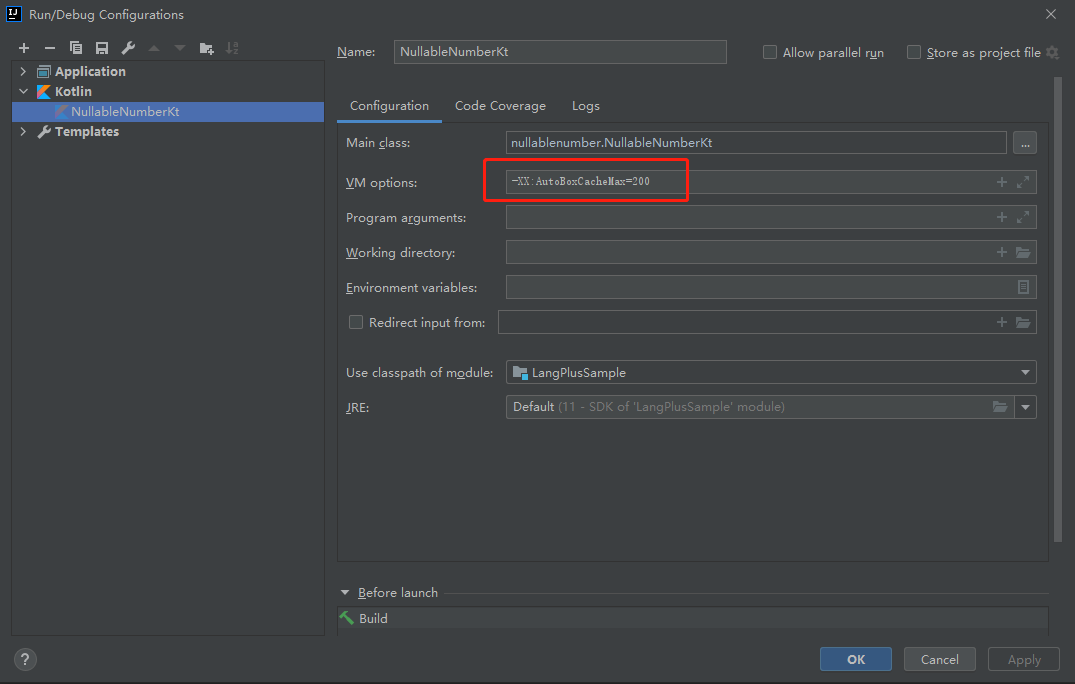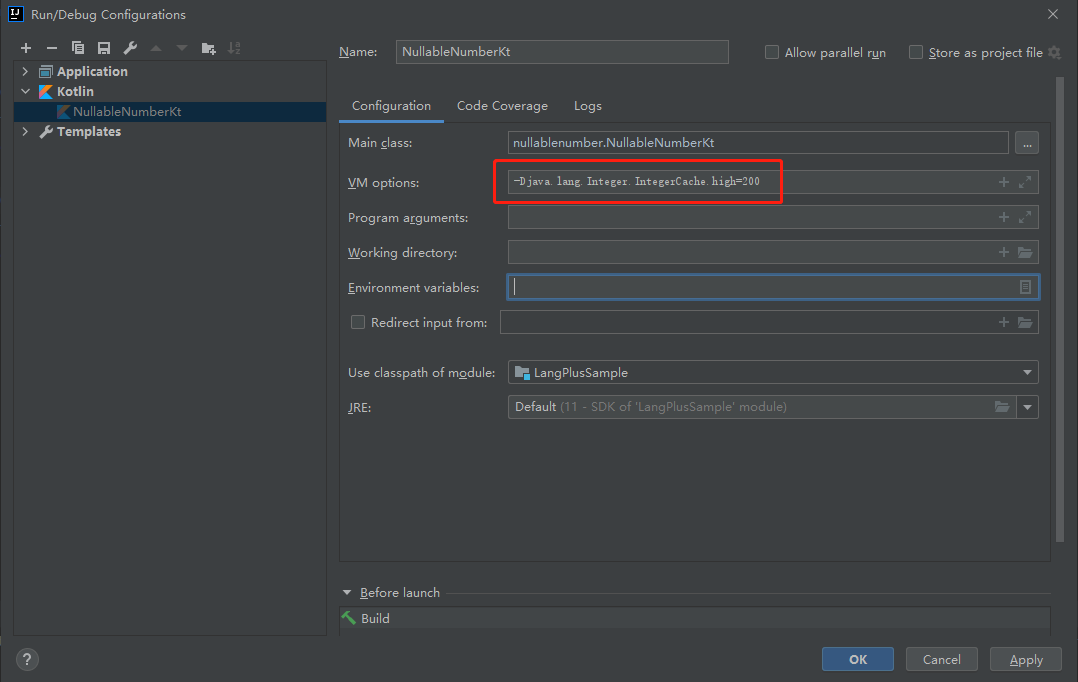
可能一眼看不懂的几行Kotlin代码
发布于2021-05-29 19:25 阅读(1326) 评论(0) 点赞(16) 收藏(0)
看两段代码
第一段代码:
val a: Int = 100
val boxedA: Int? = a
val anotherBoxedA: Int? = a
val b: Int = 10000
val boxedB: Int? = b
val anotherBoxedB: Int? = b
println(boxedA === anotherBoxedA) // true
println(boxedB === anotherBoxedB) // false
第二段代码:
val a: Int = 10000
println(a == a) // Prints 'true'
val boxedA: Int? = a
val anotherBoxedA: Int? = a
println(boxedA == anotherBoxedA) // Prints 'true'
代码来自【Kotlin官方文档】:https://kotlinlang.org/docs/basic-types.html#numbers-representation-on-the-jvm
疑问
第二段代码好理解,boxedA 和 anotherBoxedA 进行值比较调用的是 equal() 方法,比较结果必然为 true 。但是第一段代码,两个表达式都是比较对象引用,为什么一个是 true 另一个是 false ?我们尝试将第一段代码换写为Java语言,得到的比较结果和Kotlin一样。
int a = 100;
Integer aBox = a;
Integer aAnotherBox = a;
int b = 10000;
Integer bBox = b;
Integer bAnotherBox = b;
System.out.println(aBox == aAnotherBox); // true
System.out.println(bBox == bAnotherBox); // false
同时我们在末尾再加上一段测试代码,采用直接new的方式构建对象,得到的比较结果为false。
int c= 100;
Integer cBox = new Integer(c);
Integer cAnotherBox = new Integer(c);
System.out.println(cBox == cAnotherBox); // false
原理
基础知识
- Kotlin中三等号(===) 比较的是两个引用在内存中指向的是不是同一对象(即同一内存空间),双等号(==) 比较的是值;
- Kotlin中的非空Number类型对应到JVM平台是基本类型:int,double等等;
- Kotlin中的可空Number类型对应到JVM平台是封装类型:Integer,Double等等;
- Java中双等号(==)比较的是两个引用在内存中指向的是不是同一对象(即同一内存空间);
- Kotlin中三等号等价于Java中的双等号;
字节码分析
val a: Int = 100
L0
LINENUMBER 12 L0
BIPUSH 100
ISTORE 1
val boxedA: Int? = a
val anotherBoxedA: Int? = a
L1
LINENUMBER 13 L1
ILOAD 1
INVOKESTATIC java/lang/Integer.valueOf (I)Ljava/lang/Integer;
ASTORE 2
L2
LINENUMBER 14 L2
ILOAD 1
INVOKESTATIC java/lang/Integer.valueOf (I)Ljava/lang/Integer;
ASTORE 3
从字节码不难看出,非空 Int 型数据,直接使用BIPUSH压栈(取值 -128~127 时,JVM 采用 BIPUSH 指令将常量压栈)。而针对非空Int型变量赋值给可空 Int 型声明,是通过 Integer 类的 public static Integer valueOf(int i) 方法实现。
查看 Integer 类中 public static Integer valueOf(int i) 方法源码:
public static Integer valueOf(int i) { if (i >= IntegerCache.low && i <= IntegerCache.high) return IntegerCache.cache[i + (-IntegerCache.low)]; return new Integer(i);}
看到 IntegerCache 的一瞬间感觉一切都清晰了。JDK 从 1.5 版本开始,把 -128~127(high的默认值) 的数字缓存起来了,用于提升性能和节省内存,通过 -XX:AutoBoxCacheMax=<size> 来控制high的取值。所以,当数字在缓存范围内时,通过valueOf()方式拿到的对象引用全部来自于缓存列表,所以对于相同的值,对象引用相同;若是超过缓存范围,则是重新生成的对象,自然也就不相等了。此时回头看开头的两段 Kotlin 代码和我们改写的 Java 代码,就很清晰了。
/** * Cache to support the object identity semantics of autoboxing for values between * -128 and 127 (inclusive) as required by JLS. * * The cache is initialized on first usage. The size of the cache * may be controlled by the {@code -XX:AutoBoxCacheMax=<size>} option. * During VM initialization, java.lang.Integer.IntegerCache.high property * may be set and saved in the private system properties in the * sun.misc.VM class. */private static class IntegerCache { static final int low = -128; static final int high; static final Integer cache[]; static { // high value may be configured by property int h = 127; String integerCacheHighPropValue = sun.misc.VM.getSavedProperty("java.lang.Integer.IntegerCache.high"); if (integerCacheHighPropValue != null) { try { int i = parseInt(integerCacheHighPropValue); i = Math.max(i, 127); // Maximum array size is Integer.MAX_VALUE h = Math.min(i, Integer.MAX_VALUE - (-low) -1); } catch( NumberFormatException nfe) { // If the property cannot be parsed into an int, ignore it. } } high = h; cache = new Integer[(high - low) + 1]; int j = low; for(int k = 0; k < cache.length; k++) cache[k] = new Integer(j++); // range [-128, 127] must be interned (JLS7 5.1.7) assert IntegerCache.high >= 127; } private IntegerCache() {}}
IDEA 配置调整high值
通过配置
-Djava.lang.Integer.IntegerCache.high=<size>或者-XX:AutoBoxCacheMax=<size>调整阈值。


延伸
除了 Integer类,Character 、Byte 、 Short 、 Long 等类型也有类似的缓存,只是除了 Integer 外,其他类的缓存范围是不可变的。
private static class ByteCache { private ByteCache(){} static final Byte cache[] = new Byte[-(-128) + 127 + 1]; static { for(int i = 0; i < cache.length; i++) cache[i] = new Byte((byte)(i - 128)); }}
private static class CharacterCache { private CharacterCache(){} static final Character cache[] = new Character[127 + 1]; static { for (int i = 0; i < cache.length; i++) cache[i] = new Character((char)i); }}
private static class ShortCache { private ShortCache(){} static final Short cache[] = new Short[-(-128) + 127 + 1]; static { for(int i = 0; i < cache.length; i++) cache[i] = new Short((short)(i - 128)); }}
private static class LongCache { private LongCache(){} static final Long cache[] = new Long[-(-128) + 127 + 1]; static { for(int i = 0; i < cache.length; i++) cache[i] = new Long(i - 128); }}
原文链接:https://blog.csdn.net/poorkick/article/details/117265706
所属网站分类: 技术文章 > 博客
作者:怎么没有鱼儿上钩呢
链接:http://www.javaheidong.com/blog/article/207056/bf7360b1f4e08b6bc707/
来源:java黑洞网
任何形式的转载都请注明出处,如有侵权 一经发现 必将追究其法律责任
昵称:
评论内容:(最多支持255个字符)
---无人问津也好,技不如人也罢,你都要试着安静下来,去做自己该做的事,而不是让内心的烦躁、焦虑,坏掉你本来就不多的热情和定力